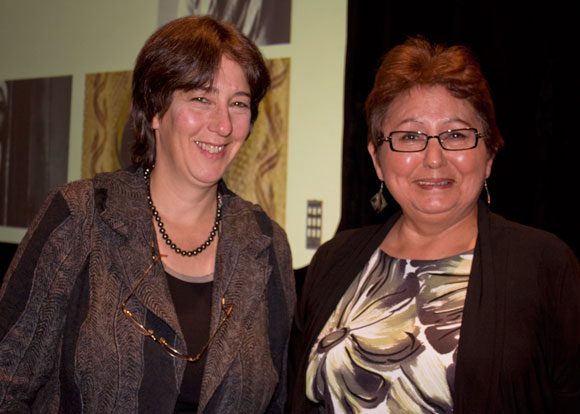Imagine, “A school girl without a school, without the fun and excitement of school. A child without games, without friends, without fun, without birds, without nature, without fruits, without sweets. With just a little powdered milk, in short, a child, without a childhood. A wartime child.”
These lines are from the diary of Zlata Filipovic, describing her life as a 10-year-old girl living in Sarajevo during the Bosnian war.
Nov. 5 was the 32 Holocaust Education Week. This year’s theme is “remembering, reflecting, and responding,” said Karen Polak, educator-in-residence from the Anne Frank House in The Netherlands.
On Tuesday, at Centennial College, Progress campus, Polak shared excerpts from the diaries of young people living through war ‘to explore the meaning of the past in the present.”
“It is people being able to express themselves and using their voice to reach out to other people,” she said. “We need to think about what the history means and how it can lead to us responding.”
Polak said that while Filipovic was writing her diary “she was living in a town under siege.”
“Filipovic met a journalist and was taken out of Sarajevo to France, where her diary was published,” Polak said.
Speaking to students and Scarborough residents, Polak also used the story of Malala Yousafzai as a modern example of the impact one voice can have.
In Swat, Pakistan, the Taliban denied girls such as Yousafzai the right to an education simply because she is a girl.
Polak, who has worked at the Anne Frank House for 20 years, read the following passage from Yousafzai’s diary:
“The night was still to the noise of artillery fire and I woke up three times. But since there was no school, I got up later at 10 a.m. Afterwards, my friend came over and we discussed homework. Today is 16 January [2009], the last day before the Taliban’s edict comes into effect, and my friend is discussing homework as if nothing out of the ordinary has happened.”
Polak said Yousafzai met a journalist from the BBC and together they thought she should write a blog under a pseudonym.
In 2009, the BBC News Website started publishing Yousafzai’s diary entries when she was just 11 years old.
Adults have a kind of ulterior motive, but the young people writing are often more honest about what they are really thinking or feeling
— Karen Polak
But Yousafzai’s life was nearly ended when a member of the Taliban shot her in the head last month. She was rushed to a hospital in the U.K. along with her family.
During the ordeal, Yousafzai’s message was spread across the world to inspire many to fight against atrocities.
“Her voice succeeded in getting the world engaged and standing up and saying ‘of course girls have to be able to go to school, wherever they are,’” Polak said.
Polak also said the voice of young people is more compelling than adults.
“Adults have a kind of ulterior motive, but the young people writing are often more honest about what they are really thinking or feeling,” she said. “They have not pulled so much into the rat race of trying to make a story.”
Sandra Gitlin is also a member on the Holocaust Education week committee. She says it is important to keep these stories in our minds because they encourage us to be better people.
“Education is key. People have to know the stories. If you see what is happening around you and you are aware of the thoughts of one person, you can stand up to do the right thing,” she said. “Even in the smallest way, you can show an act of kindness and compassion to humanity.”

